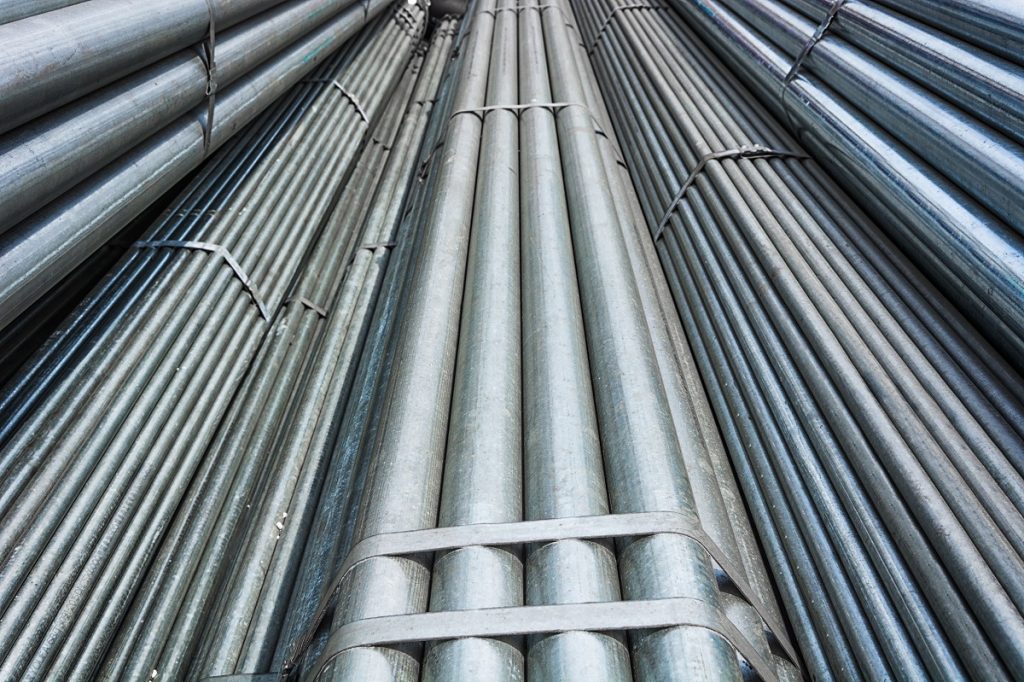What are the different applications of steel pipes?
- Automotive exhaust pipes
- Condenser tubes
- Irrigation systems
- Farm gates
- Residential gates
- Electrical conduits
There are many different applications of steel pipes that don’t necessarily limit itself to the construction industry. It can also be found across various sectors like agricultural, petrochemical, or architectural due to its many desirable properties.
As an alloy, steel is extremely durable, despite the steel pipe’s hollow formation. They’re able to withstand high temperatures and high pressures that may come from prolonged usage. For example, steel pipe manufacturers can apply heat treatment processes in order to enhance properties like tensile strength, machinability, and hardenability. This allows the product to be more suitable for and withstand a higher level of wear and tear than the average. Read on to learn more.
Automotive exhaust pipes
Steel pipes can be designed to fit automotive exhaust systems. If you don’t already know, the exhaust function of a vehicle ensures that the regular exchange of gasses works properly all throughout the combustion process. Oftentimes, the car’s exhaust pipes can be subject to high levels of heat — using steel pipes for this component prevents instances of broken tubing.
Steel pipes are hard-wearing, meaning they’re able to retain their shape and function for the car’s exhaust system. Other exhaust pipes can overheat for some time and can place a burden on the vehicle — steel pipes, however, are not. Instead, they offer improved performance for the car and reduce the need for repair or part replacement.
Condenser tubes
Condenser tubes are found in many HVAC systems, pressure vessels, or turbines and they’re typically used for heat exchange. These components need to be inspected ever so often to ensure that no leakages, breakages, or pitting occur. Since steel pipes are highly resistant to corrosion, they make another good choice as condenser tubing material.
When pitting occurs in pipes, it’s almost difficult to repair, which is why durable materials such as steel are often used. These problems are also difficult to detect and may cause an entire condenser system to fail. Steel pipes not only prevent instances of this happening, but they’re also relatively easy to install. If there are any replacements that need to be done on existing tubing, steel pipes can be safely carried and attached using the right fittings.
Irrigation systems
Another popular use of steel pipes can be found in agriculture, particularly in irrigation systems. Simply put, irrigation is a method used to keep plants healthy. Instead of having to rely on manual methods of watering greenery, irrigation is a far more convenient and automated method of water conveyance and distributions. It involves steel pipes, valves, fittings, filters, emitters, automation equipment, as well as other irrigation components.
Steel pipes can easily serve as a vessel to carry the water that is consistently flowed in irrigation systems. Due to their sturdiness, they require very little maintenance. Although the initial cost of steel piping in irrigation can be expensive, this will eventually pay off and present cost-effective options. Anyone using steel pipes in this type of system wouldn’t have to spend on unnecessary repairs that can be expensive.
Farm gates
Steel pipes can be fashioned and designed to become farm gates for the agricultural sector. Unlike other materials, they’re far sturdier and can be machined into different sizes to create a safe enclosure that can house different farm animals like carabao, pig, goat, or chicken.
Although wood is a popular material used in farm gates, it may not be sturdy enough to retain its form under extreme weather conditions like heat and heavy rain. After all, wood panels need to be consistently stained and waterproofed to ensure that its fibers don’t rot. You won’t find the same situation with steel pipes if they’re used as farm gates. They can come as a pre-engineered steel pipe framework, or as individual steel pipes that can be strongly welded together to form the enclosure. Ultimately, they offer a stable structure that won’t easily deform in cases of high-impact caused by movement.
Residential gates
Aside from farm gates, steel pipes can also be machined into residential gates for any kind of contemporary home. Steel pipes not only have functional but also design aspects that any homeowner may want to take advantage of.
Steel gates offer any household with a high level of security. Hardened steel is extremely difficult to deform and bend — any unwanted trespassers inside a residential space would be deterred by the solid structure of steel gates.
For more decorative aspects, steel pipes can also be galvanized to improve upon their properties. Galvanized steel pipes can provide your gates with a shinier and more elegant finish that you otherwise wouldn’t find with other types of structures.
Electrical conduits
Electrical conduits are mainly used for protecting and rerouting wires in an electrical system. Although conduits can be made from materials like PVC, plastic, or fibers, metal is also common.
Steel pipes used as conduits are typically referred to as rigid metal conduit. These conduits have undergone the galvanizing process to create a corrosion-resistant finish, instead of having to use stainless steel altogether. RMC can come in various lengths, depending on the length of wiring to be enclosed. Steel RMC offers great protection against electrical wires or other faulty wiring situations.
Key Takeaway
The different applications of steel pipes can be found in irrigation systems, electrical wiring, HVAC systems, as well as exhaust components. Steel pipes can be further heat treated or galvanized as a way of enhancing their strength and corrosion-resistant properties. With a versatile material such as the steel pipe, there’s no doubting that manufacturers would find newer ways of utilizing this simple, yet valuable steel product.
